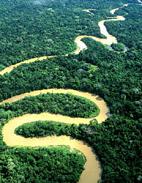Brazil gambles on Amazon logging
 A Brazilian government plan set to go into effect this year will bring large-scale logging deep into the heart of the Amazon rain forest for the first time, in a calculated gamble that new monitoring efforts can offset any danger of increased devastation.
A Brazilian government plan set to go into effect this year will bring large-scale logging deep into the heart of the Amazon rain forest for the first time, in a calculated gamble that new monitoring efforts can offset any danger of increased devastation.
The government of President Luiz Inacio Lula da Silva, in an attempt to create Brazil's first coherent, effective forest policy, is to begin auctioning off timber rights to large tracts of the rain forest.
The winning bidders will not have title to the land or the right to exploit resources other than timber, and the government says they will be closely monitored and will pay a royalty on their activities.
The architects of the plan say it also will help reduce tensions over land ownership in the Amazon, the world's largest tropical forest, which loses an area the size of New Jersey every year to clear-cutting and timbering. In theory, 70 percent of the jungle is public land, but miners, ranchers and especially loggers have felt free to establish themselves in unpoliced areas, strip the land of valuable resources and then move on, mostly in the so-called arc of destruction on the eastern and southern fringes of the jungle.
But the program for monitoring loggers allowed into the rain forest's largely untouched center will come from a new, untested Forest Service with only 150 employees and from state and municipal governments.
That concerns environmental and civic groups because local officials are more vulnerable to the pressures of powerful economic interests and to corruption. Further, the new system assumes that the world community also will play a part and buy timber only from merchants who are properly licensed and will avoid unscrupulous dealers.
The plan "can be a good idea in places where the situation is already chaotic," said Philip Fearnside, a researcher at the National Institute for Amazon Research in Manaus who recently visited this remote area. "But it's a different story in areas where hardly any logging or deforestation has taken place, where you are actually going to be encouraging the introduction of predatory forces that don't exist there now."
On paper and in principle, said Stephan Schwartzman, an Amazon specialist at Environmental Defense, an advocacy group in Washington, "I think everyone agrees that this system is an improvement over the current situation, which is totally out of control."
But in the end, he said, "everything is going to depend on how it is done and whether the financial and human resources are there to make it work." Here in this small settlement whose name means Reality, along the rutted Highway BR-319, those resources do not yet exist, as residents have discovered.
When outsiders recently appeared to fish out of season, wiping out protected species and killing three manatees, the peasants here went to the authorities looking for help, only to be turned away. "They told us that we had to be the monitors ourselves, but we don't have the ability to do that," said Antonio Marfoni, a settler. "There's no working phone here, and we don't have the money or the time to be able to take the bus into town to denounce violations."
In October, during the final debate of the presidential campaign, the opposition candidate, Geraldo Alckmin, called the plan "irresponsible," accused da Silva of wanting to "privatize the Amazon" and added, "If today there is no supervision, imagine what will happen if you hand it over to the private sector."
Though the environmental movement was one of the founding constituencies of da Silva's Workers' Party, he made it clear after being re-elected to another four-year term that his main goal was to get the Brazilian economy growing at 5 percent a year.
(Published by Chicago Tribune, January 15, 2007)